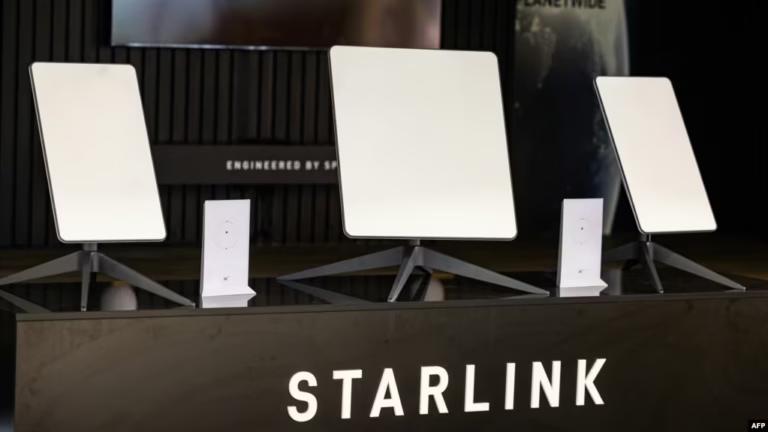
Starlink’s Signal to Scammers: U.S. Calls for Myanmar Geoblock After Billion-Dollar Fraud Surge
Starlink’s satellite internet has unintentionally become the backbone of billion-dollar scam networks operating inside Myanmar’s fortified compounds. Despite law-enforcement crackdowns, the technology’s resilience has enabled traffickers and fraud syndicates to recover operations swiftly—prompting urgent calls from U.S. lawmakers for SpaceX to geoblock access in high-risk regions.
A Digital Lifeline for Criminal Networks
In the criminal underworld of Southeast Asia, high-speed satellite internet—once hailed as a bridge across the digital divide—has become an unexpected weapon.
Elon Musk’s Starlink, operated by SpaceX, is now powering massive online scam centers in Myanmar. These “scam cities,” hidden behind guarded walls, employ tens of thousands of trafficked workers forced into global fraud schemes—from cryptocurrency cons to romance scams known as “pig-butchering.”
Investigations reveal that when Thai authorities severed traditional internet lines earlier this year, Starlink terminals quickly appeared on rooftops inside Myanmar’s border compounds. Within days, operations were back online—illustrating how satellite connectivity, while revolutionary, can also empower organized crime beyond the reach of local governments.
Inside Myanmar’s Expanding Scam Compounds
Satellite images and field reports highlight rapid growth in areas such as KK Park near Myawaddy, one of the largest scam hubs in the region.
A WIRED investigation found hundreds of Starlink terminals operating there, sustaining networks that collectively steal billions of dollars from victims worldwide.
These compounds—often controlled by Chinese-led criminal syndicates—detain workers through violence and coercion. The United Nations and international NGOs have documented cases of torture and human trafficking within these facilities.
U.S. Senator Maggie Hassan has since urged Elon Musk and SpaceX to geoblock Starlink access in Myanmar’s criminal zones, citing UN evidence that the technology directly enables scam operations.
Starlink’s Unintended Role and Oversight Gaps
Starlink’s popularity among bad actors lies in its independence from local infrastructure.
Unlike fiber or mobile networks, its satellites connect users without the need for government-approved ground stations. This autonomy makes it almost impossible for authorities to monitor or disable within lawless border regions, where state control is weak.
An AFP investigation published by Digital Journal reported that despite a 2025 crackdown, these compounds have not only survived—but expanded.
Starlink dishes remain visible across rooftops, allowing real-time communication and financial transactions for global scams.
In the U.S., California prosecutors have reportedly warned SpaceX about Starlink’s misuse. Yet, as noted by The Cool Down, the company has not publicly addressed the concerns, intensifying calls for accountability.
Calls for Global Regulation
SpaceX has previously geofenced Starlink access in conflict zones such as Ukraine and Gaza—but not yet in Myanmar’s scam centers. Experts argue this inconsistency exposes a gap in international satellite governance.
As Al Jazeera reported, Elon Musk has apologized for service outages, but has not issued statements on Starlink’s involvement in cyber-enabled trafficking and fraud.
Industry analysts warn that unless oversight frameworks evolve, satellite internet could become the next frontier for transnational crime.
Balancing Connectivity and Security
The rise of “scam cities” in Myanmar underscores a troubling paradox: the same technology designed to connect the unconnected can also empower exploitation.
Policymakers are now urging global coordination between satellite providers, governments, and anti-trafficking organizations to restrict illicit usage without hindering legitimate access.
For SpaceX, the issue goes beyond public relations. As Starlink scales to dominate global broadband, how it handles misuse could shape both its reputation and regulatory future.
In the end, bridging the digital divide should not mean bridging criminals to their victims.
Frequently Asked Questions (FAQ)
What is happening with Starlink in Myanmar?
Starlink’s satellite internet has been found powering large scam compounds in Myanmar’s border regions. These networks use the service to run global online frauds worth billions of dollars, often operated by trafficked workers inside fortified compounds.
Why is the United States asking SpaceX to geoblock Myanmar?
U.S. lawmakers, including Senator Maggie Hassan, have urged SpaceX to geoblock Starlink access in Myanmar’s scam centers after UN and media investigations showed the technology is enabling criminal operations that target victims worldwide.
How are Starlink terminals being misused?
Criminal syndicates use Starlink terminals to maintain high-speed connectivity even when local authorities shut down traditional internet or power lines. This allows scam operations to resume quickly after crackdowns.
What are Myanmar’s “scam compounds”?
Scam compounds—also called “scam cities”—are heavily guarded enclaves in border areas such as Myawaddy. Inside, thousands of trafficked workers are forced to carry out online scams involving cryptocurrency, romance fraud, and investment schemes.
What has SpaceX said about these allegations?
As of now, SpaceX has not issued a formal statement addressing Starlink’s role in Myanmar’s scam centers. Critics argue that the company needs stronger monitoring and region-specific geoblocking to prevent criminal misuse.
Can Starlink be geoblocked in specific regions?
Yes. Starlink can technically block service in defined geographic zones. SpaceX has previously used this capability in conflict areas such as Ukraine, Gaza, and parts of Africa—but has not yet applied it to Myanmar’s scam compounds.
What solutions are being proposed?
Experts recommend global cooperation between governments, satellite companies, and anti-trafficking organizations to regulate satellite connectivity and prevent misuse without hindering legitimate internet access.
Related posts:
 Myanmar junta fortifies Sittwe as AA nears Rakhine
Myanmar junta fortifies Sittwe as AA nears Rakhine
 China Executes 5 from Myanmar Scam Gang in Fraud Crackdown
China Executes 5 from Myanmar Scam Gang in Fraud Crackdown
 UN Special Rapporteur Report on Myanmar Rights
UN Special Rapporteur Report on Myanmar Rights
 East Timor’s ASEAN Gamble: Mending Ties with Myanmar Junta
East Timor’s ASEAN Gamble: Mending Ties with Myanmar Junta
 Myanmar’s Power Crisis: Energy Politics in the Dark
Myanmar’s Power Crisis: Energy Politics in the Dark
 Myanmar National Unity Government 2025 Faces Calls for Reform
Myanmar National Unity Government 2025 Faces Calls for Reform
